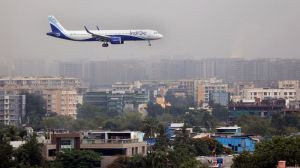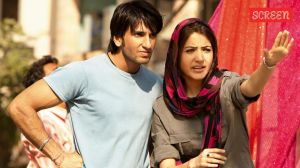PM puts up brave face: Oppn for early polls,will stay the course
PM put up a brave face saying UPA II would 'stay the course' until the end of its term.
Amid growing perception of a government adrift,Prime Minister Manmohan Singh today put up a brave face saying UPA II would stay the course until the end of its term. While he admitted that the government could have failed to manage (public) perceptions and should now focus on that he accused the Opposition of being prematurely restless to force (an) early election. He also claimed that attempts were being made to destabilise (the) polity.
Addressing a press conference on board Air India One returning from his visit to New York via Frankfurt,Singh said there was no dissension in his cabinet in the context of the recent finance ministry note which suggested that had P Chidambaram insisted on an auction,then telecom minister A Raja would have had to cancel the licences.
Singh said that in the Cabinet,there are always debates with an open mind,
The Ministers have a different perspective. That doesnt amount to lacking cohesiveness, he said. Now as far as the approval of UPA-II is concerned,the issues the government is accused of indulging in 2G or something else the Opposition thinks,should have happened before elections, Singh said. I think it has failed. They lost the elections and till then we have had this Assembly (elections). The Congress party has been successful…Therefore,I suspect there are other forces which want to destabilise our country.
I have said this in Parliament that we have the mandate of the people to govern for five years and the Opposition should wait for two-and-a-half years…They have got some weak points of our government and think that (they) can force elections. This is not the way. This government has the mandate for five years. It will stay its course, he said. Once this happens,and if we look behind (after completing the term),we would have surprised (everyone).
He reiterated that Chidambaram enjoyed his full confidence. He said he had read the Finance Ministry note (of March 25). All these matters are now before the courts. And its not appropriate for me to make a comment. These are also property of the people (under RTI), Singh said.
Singh underlined what he called the substantive challenges the country faced: the global financial environment and the steep hike in crude prices. The silver lining for India,he said,was that it had successfully weathered this crisis. The current growth rate between 7.8 and 8.5 per cent was a healthy one,the PM said,and the 9 per cent target was possible despite the global turmoil.
To this effect,the Prime Minister said,it was essential that all political parties forget their differences and work together. In fact,such political unanimity was needed,he said,to pass crucial legislation that included Bills on reforms in insurance,education,pension,public procurement as well as the Lokpal.
He said that India now had the support of a large number of countries including the US and Russia for permanent membership of the UN Security Council but some members of the council were still cold to the idea. I am not belittling any members of the Security Council but the climate of global support is in our favour, he said.
On US statements that the Haqqani terror network was the veritable arm of Paks ISI,he said: This is nothing new to us…we have been trying to flag this issue for several years and the world now recognises what India was saying was the truth.
Asked about the fate of those convicted for the assassination of former Prime Minister Rajiv Gandhi who have been on Death Row for several years he said: Let the law take its own course.
On the protests in Tamil Nadu against the nuclear reactor at Koodankulam,Singh said the government was committed to creating world class security features at its nuclear installations. There is no alternative to our reliance on nuclear energy as an essential component for our energy needs and as far as Tamil Nadu is concerned,I have spoken to the Chief Minister and she has been very receptive. We will sit down and find solutions.
He said the government was committed to protecting domestic industry even as the proposal for bringing in FDI in the retail sector was being examined. The five priorities for the government,he said,were: stepping up agricultural production; developing the education and food sectors; enabling employment and accelerating infrastructure development for roads,railways and airports.
- 01
- 02
- 03
- 04
- 05































